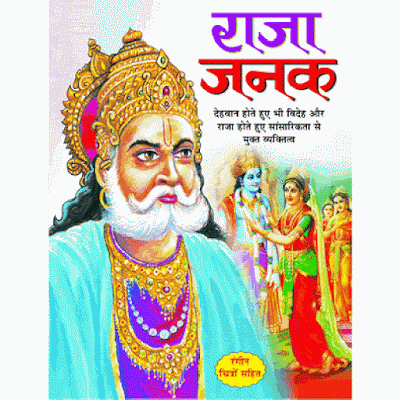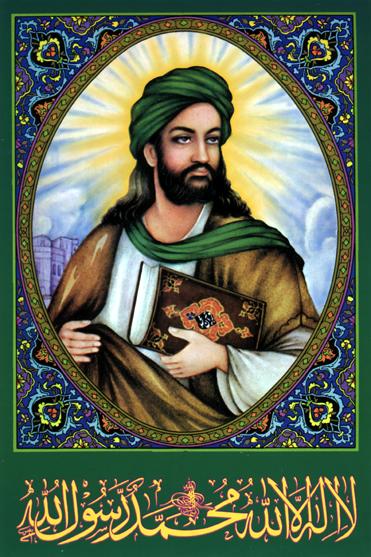Shri Raja Janaka
Shri Raja Janaka
Seeradhwaja Janaka was a great scholar and an enlightened person. His life dates back to 8000 BC; he was the King of Mithila (the current Janakpur) and Shri Sita's father (Shri Ram's wife).
It is interesting to note the composition of his city's name, Mith+Ila: ‘Mith’ derives from Mithya, that means illusory, and ‘Ila’ means Atman. The words together mean ‘Illusion of Atman’. The result is very interesting as helping people to win over their illusions and realize their atman is just the main task of the Guru.


Typo in above image : His life dates back to 8000 BC;
The Ashtavakra Samhita - teachings about nondualism
The Ashtavakra Samhita is an Advaita Vedanta scripture that documents a dialogue between the master Ashtavakra and his disciple Raja Janaka. It shows the basics of the nondualism (Advaita) -
“Nothing but the Spirit exists”, “The Sage is free from the pairs of opposites as it is a child” - that leads to the comprehension of the illusoriness of all the pairs of opposites - “I renounced to the good and the bad and I live happy” - and to the Self Realization - “Thinking to the Absolute you do nothing but using a form of thought. So, dropped this thought, I permanently dwell in my Self.”
Realizing the Self, Ashtavakra emphasizes, does not mean becoming, but being the Self:
“Having realized that the Self is in everything and that everything is in the Self, free from the sense of individuality and possessiveness, be happy”.
A great knower of Atma - Atma Jnana
One day, Raja Janaka sent a message to the people in his kingdom: “If there is a great Sage, whoever he may be, let him come and teach me the knowledge of Atma. If this person offering to teach me Atma Jnana is not able to accomplish this task of providing me an experience of instant illumination then I don't want to see him, even if he is the most learned person in the land”.
All the Pundits and Rishis were a little frightened by this requirement, except for one: a young man called Ashtavakra. He went straight to the King and offered to solve the problem if the King satisfied two conditions: the first one was going to the forest, that is in a pure, sattva place; the second one was more delicate: «You must give me your mind» said Ashtavakra.
So they went alone into the forest and Janaka sat, close to his horse and remained silent with closed eyes, and did not move even when his officers and Ministers came and called him; only when Ashtavakra called him, he moved.
So Ashtavakra questioned him:
«Many people came, why didn't you reply to their calls?»
Raja Janaka answered, «Thoughts, words and deeds are associated with the mind, and I offered my mind entirely to you. Therefore before I can use the mind for anything, I need your permission. What authority do I have to speak to anyone or use this mind in any way without your permission and command?».
Then Ashtavakra said: «You have attained the state of God-realization».
Raja Janaka used to attend the lessons given by the enlightened master Suka. One day the master decided to test his disciples. The disciples were just listening to ‘Atma Bodha’ (the lesson saying that the Atma alone is real and that everything else is appearance, imposed on the Atma, by the fog of illusion and ignorance), when the master managed with his mystic powers so that they could see in the far distance the city of Mithila caught in flames and crumbling in the conflagration.
Then Ashtavakra said: «You have attained the state of God-realization».
Being a devoted disciple to become a good master
Raja Janaka used to attend the lessons given by the enlightened master Suka. One day the master decided to test his disciples. The disciples were just listening to ‘Atma Bodha’ (the lesson saying that the Atma alone is real and that everything else is appearance, imposed on the Atma, by the fog of illusion and ignorance), when the master managed with his mystic powers so that they could see in the far distance the city of Mithila caught in flames and crumbling in the conflagration.
Immediately, all the disciples ran away to save their belongings and warn the other people, while Raja Janaka, unperturbed, remained with his master, even if he had a lot to save as he was just its king. As his master asked him why he did not try to save his city, he replied:
«My master and dear friend, the only treasure that I have is you!».
In this way, Raja Janaka showed detachment and the true devotion of a disciple, as the only treasure he cared of was the Jnana he was getting from his master.
One day, a young sage named Narada asked:
Being Videha - the bodiless
One day, a young sage named Narada asked:
«Sir, how is it possible that they call you Videha (i.e. beyond physical bonds) if you live in such a luxurious world?».
Raja Janaka replied:
«It is very simple. I'll tell you tonight. But for now just follow me holding this bowl of milk. Be careful not to spill even a drop of it!».
Narada did as he was told and followed the King making sure that the milk did not spill over. At the end of the day he was really exhausted.
«Please answer my question now, O Great King. I can’t bear any more following you everywhere and caring of this bowl at the same time!».
«First, tell me: what did you see while following me?” Raja Janaka asked to Narada;
«Nothing but the bowl» answered Narada «I watched it all the time so that the milk wouldn’t spill!»
«What?» replied the king, «There was a ceremony in my honour, then a dance performance and many other beautiful things. Is it possible that you didn't see anything of it?»
«No my Lord, I didn’t see anything.»
«My boy» said the king finally, «I never see anything either. I spent all my time observing my attention so that it didn’t go to waste, just like your milk».
So Narada understood why Raja Janaka was called Videha.
So Narada understood why Raja Janaka was called Videha.






Comments
Post a Comment